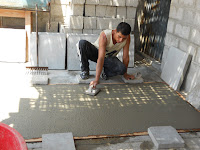 THROUGH THIS POST I WOULD LIKE TO SHARE WITH YOU ALL about a new initiative related to development of affordable housing here in Chimbote-Perú. It is about PAPERCRETE PANELS PROJECT. It was born with the purpose of making possible that poor families in the area are able to acquire a decent housing to live. It is opportune to highlight the invaluable contribution and selfless support of Mr. Earl Milbrath (from Minnesota-USA) as a catalyst element for this project. Presently he is the president of the Economic Development Council (EDC) which is a committee operating under the direction of the non-profit organization Los Amigos del Padre Juan.
THROUGH THIS POST I WOULD LIKE TO SHARE WITH YOU ALL about a new initiative related to development of affordable housing here in Chimbote-Perú. It is about PAPERCRETE PANELS PROJECT. It was born with the purpose of making possible that poor families in the area are able to acquire a decent housing to live. It is opportune to highlight the invaluable contribution and selfless support of Mr. Earl Milbrath (from Minnesota-USA) as a catalyst element for this project. Presently he is the president of the Economic Development Council (EDC) which is a committee operating under the direction of the non-profit organization Los Amigos del Padre Juan.
 Mr. Earl Milbrath is doing his best, through several ways, for all programs of CHOI to keep running. At this point I must say that CHOI is sponsoring this Papercrete Project. Mr. Orlando Bermúdez, the present executive director of CHOI, is in charge of this project and Mr. Carlos Alayo is in charge of the technical part of the project. At the end of the last month, March, after spending some time putting together resources needed to the project, Mr. Carlos Alayo started its implementation.
Mr. Earl Milbrath is doing his best, through several ways, for all programs of CHOI to keep running. At this point I must say that CHOI is sponsoring this Papercrete Project. Mr. Orlando Bermúdez, the present executive director of CHOI, is in charge of this project and Mr. Carlos Alayo is in charge of the technical part of the project. At the end of the last month, March, after spending some time putting together resources needed to the project, Mr. Carlos Alayo started its implementation.
But you may be wondering yourself, what is papercrete? Well, it comes from the union of two words: Paper + Concrete = Papercrete. Let me share a little more about it. Papercrete is a recently developed construction material, an amazing building material. It is made from recycled paper with a small amount of cement (concrete) and sand added. The ratio paper/concrete/sand is 3/1/1. Before making the mixture, paper should has been soaked in water for several days. Then it must be crumbled using an appropriate proportion of water. It would be better if it is used a mixer to do this process.
After paper is crumbled it is time to prepare mixture. The paper/concrete/sand combination is stirred in a large barrel, much like a blender, until all paper is shredded and evenly mixed with the concrete and sand. After mixture has an uniform texture it is poured in any type of mold, prepared in advance. It is allowed to dry for a while and already it is gotten papercrete products: bricks for walls, blocks, etc, to use them in constructions. Papercrete can be mortared, drilled, hammered, nailed, used as plaster and as an infill between poles or studs.
To make papercrete, it can be used nearly any kind of paper. Cardboard, glossy magazine stock, advertising brochures, junk mail, etc. Some types of paper work better than others, but all types work. Newsprint is best. Waterproofed paper and cardboard, such as butcher paper, beer cartons, etc. are harder to break down in water. Catalogs, magazines and other publications are fine.
Back to this Papercrete Project, the place chosen to run it was Saint Mauricio Brickwork, property of an American lady named Veronica Miuller and located in Ramal Playa village here in Chimbote. So, Mr. Carlos Alayo was there and made a planch of papercrete. People in charge of this project are gonna try to make bricks of papercrete as well. This time is to make prototypes and test papercrete products.
Click on the image below or on the link to see more PICTURES.
 ON THIS POST, I WOULD LIKE TO SHARE with you all the second activity about making of concrete blocks to be used as floor in houses. As you must know, by the first activity on this initiative, the main goal is to provide the posibility the poor residents of Chimbote may count on concrete floor at low price for their houses and this way avoding family members, specially little children, may get some kind of disease, breathe air mixed with dust, etc. because of having soil floor. In this second activity Mr. Carlos Alayo along with an assistant were making more concrete blocks.
ON THIS POST, I WOULD LIKE TO SHARE with you all the second activity about making of concrete blocks to be used as floor in houses. As you must know, by the first activity on this initiative, the main goal is to provide the posibility the poor residents of Chimbote may count on concrete floor at low price for their houses and this way avoding family members, specially little children, may get some kind of disease, breathe air mixed with dust, etc. because of having soil floor. In this second activity Mr. Carlos Alayo along with an assistant were making more concrete blocks.






